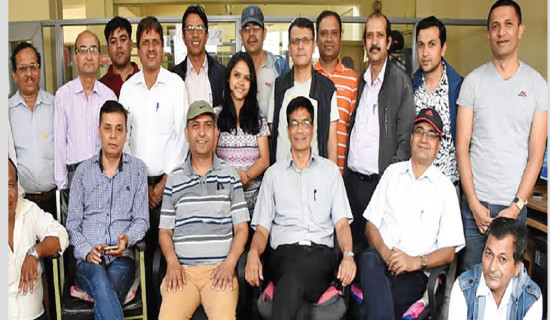- Monday, 23 February 2026
58thAnniversary Special Supplement
Media's Contribution In Health Sector Transformation
The media plays a crucial role in public health by serving as a powerful conduit for information dissemination and shaping public perceptions. Through newspapers, radios, TVs, and online and digital platforms, people receive valuable information that can positively impact their health. True and compelling stories about health issues educate and raise awareness, making the information more accessible and relatable. Journalists have a unique responsibility to report on critical health issues that have a positive impact on public health and their livelihood. Their work goes beyond just reporting the news, as they dig into the depths of non-communicable diseases, natural disasters, substance abuse, and mental health challenges.
They also investigate systemic issues that affect the healthcare sector, such as corruption, anomalies, and shortages of infrastructure, medical equipment, workforce, and basic medicines. Their reporting transcends geographical boundaries, reaching remote villages. This ensures that no one is left behind when it comes to receiving health services. Their investigative reporting impels the health agencies to swing into action while alerting the people to the consequences. Health journalists have the onus to shed light on the plight of the vulnerable and the marginalised, deprived of basic health facilities. The work of health journalists is not about stealing the spotlight through attention-grabbing headlines. It's an unwavering commitment to the well-being of communities, ensuring that information enables positive change and proactive health measures. Their reporting highlights critical health issues, informs policy decisions, and obliges the authorities to take action.
The media's role in serving the people has undergone a significant transformation, particularly during the challenging times of the COVID-19 pandemic. As Nepal grappled with the pandemic, the media went beyond traditional reporting and became an instrument for guiding public behaviour. They played a crucial role in disseminating information ranging from handwashing practices to advocating for vaccines, encouraging social distancing, and alerting health authorities. Media outlets not only informed but also educated and fostered social changes, evolving into trusted guides for the public. The key role of the media in promoting public health was prominently highlighted during the pandemic. Various media platforms extensively covered issues related to public health, sanitation, and behavioural changes. Discussion forums were brimming with health concerns taking top priority.
What made health the focal point of attention was the universal impact of the pandemic. Regardless of race, economic status, or development levels, everyone felt the effects. This resulted in health issues taking centre stage in headlines across online portals, daily newspapers, and social media platforms. In essence, the media became a powerful tool for not only disseminating information but also for fostering collective awareness and responding to public health challenges. The clarity in messaging during this period became crucial, as every individual, irrespective of their backgrounds, needed to understand and act upon the shared responsibility of safeguarding public health.
In the realm of health reporting, a key principle stands tall: the fundamental right to health necessitates universal access to essential healthcare services. This assertion firmly rejects the notion that one's socioeconomic status should determine access to life-saving treatments. In this context, health journalists emerge as crucial agents of change, tasked with disseminating vital information about healthcare, raising awareness, and engaging in public discourse to address pressing health issues.
While the private sector's investment in healthcare infrastructure and the allocation of budgets for healthcare initiatives are commendable steps, persistent challenges such as corruption, malpractice, and the exploitation of vulnerable populations demand scrutiny. Here, journalists play a vital role as watchdogs, focusing on these issues, holding authorities accountable, and advocating for positive change. The journalist's duty extends further, necessitating vigilance against fake experts and the tackling of misinformation, disinformation, and fake news in health. By doing so, journalists contribute to delivering reliable views and insights to safeguard the integrity of health information for their audience.
Health literacy
A critical aspect of health journalism lies in promoting health literacy, especially in a world fighting with infectious and chronic diseases including high blood pressure, diabetes, kidney disease, and heart disease, among others. Health journalists should emphasise risk factors and promote healthy lifestyles in order to limit the health burden. Through insightful reporting and the accessible dissemination of information, they empower individuals to make informed decisions about their health.
However, health literacy faces obstacles. Illiteracy levels impede the understanding of health information, hindering preventive healthcare efforts. Economic constraints create disparities in medical access, exacerbating the struggles of the underprivileged. Geographical remoteness acts as a barrier to healthcare delivery, and inadequate infrastructure further complicates the situation.
Here, journalists evolve from mere observers to agents of change. While advocacy paves the way for policy changes, addressing economic disparities and improving healthcare infrastructure, highlighting the success stories of various health institutions and patients becomes a catalyst for positive change.
Challenges
Yet, health reporting in Nepal is fraught with challenges. Journalists face significant hurdles impacting the accuracy and timeliness of their reporting. Limited willingness from health authorities to share information and engage with the media is a major obstacle. Time constraints, outdated statistics, and difficulties in interpreting complex medical terms further hinder health reporting.
Moreover, reluctance from experts and authorities to participate in interviews hampers journalists' ability to provide comprehensive coverage. Issues of transparency, honesty, and accountability, particularly in emergency situations, pose additional hurdles. The competitive nature of breaking news, occasional denials by medical professionals, and the scarcity of reliable health statistics contribute to the complexity. Political, economic, cultural, and security considerations also heavily impede health reporting, making it a challenging task for journalists striving to deliver accurate and insightful news coverage.
Way forward
To address these challenges, journalists need training and education. Such education should focus on enhancing their understanding of medical terminology, keeping them updated on the latest technologies in the health sector, and developing their analytical abilities to understand and interpret scientific research.
Investing in such education equips journalists with the necessary skills and knowledge to tackle the complexities of health
reporting, ensuring accurate, informed, and easily understandable coverage for the benefit of the public.
In its commitment to well-being, health journalism emerges as a potent force for change in Nepal's healthcare system. Its mission is clear: it's about informing, protecting people, and saving lives.
Through a commitment to in-depth reporting, collaboration, and a nuanced understanding of challenges, Nepal can stride towards a brighter, healthier future. With the collective efforts of journalists, healthcare professionals, and policymakers, the nation can build a robust and resilient healthcare system.
(Rijal works as a journalist at The Rising Nepal.)
















